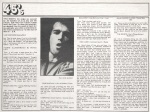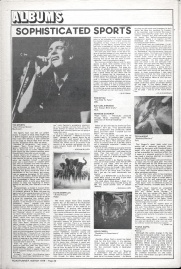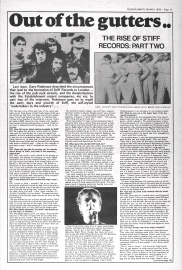Roadrunner, March 1979: Difference between revisions
(formatting) |
(formatting) |
||
| Line 65: | Line 65: | ||
{{Bibliography images}} | {{Bibliography images}} | ||
[[image:1979-03-00 Roadrunner page 20.jpg| | [[image:1979-03-00 Roadrunner page 20.jpg|x270px|border]] | ||
<br><small>Page | [[image:1979-03-00 Roadrunner page 11.jpg|x270px|border]] | ||
<br><small>Page scans.</small> | |||
<br> | |||
{{Bibliography box 360}} | {{Bibliography box 360}} | ||
<center><h3> Out of the gutters </h3></center> | <center><h3> Out of the gutters </h3></center> | ||
| Line 77: | Line 78: | ||
'''[[Roadrunner, February 1979|Last issue]], Dave Robinson described the circumstances that lead to the formation of Stiff Records in London — the rise of the pub rock circuits, and the dissatisfaction with the Establishment record companies, etc etc. In part two of the interview, Robinson goes on to recall the early days and growth of Stiff, the self-styled "undertakers to the industry." | '''[[Roadrunner, February 1979|Last issue]], Dave Robinson described the circumstances that lead to the formation of Stiff Records in London — the rise of the pub rock circuits, and the dissatisfaction with the Establishment record companies, etc etc. In part two of the interview, Robinson goes on to recall the early days and growth of Stiff, the self-styled "undertakers to the industry." | ||
{{Bibliography text}} | {{Bibliography text}} | ||
[[image:1979-03-00 Roadrunner page | [[image:1979-03-00 Roadrunner page 19 clipping 01.jpg|140px|border|center]] | ||
We had a tiny office and most of the room was taken up by these boxes of eight-track tapes which were the demos we had from the Hope and Anchor studio days. I've still got millions of them. If I had the time, I'd love to put together a 10-record set in a box. You'd sell about 2000 copies but the people who bought them would have everything there on record. Once it's on vinyl it becomes something special — well, to me, anyway. | We had a tiny office and most of the room was taken up by these boxes of eight-track tapes which were the demos we had from the Hope and Anchor studio days. I've still got millions of them. If I had the time, I'd love to put together a 10-record set in a box. You'd sell about 2000 copies but the people who bought them would have everything there on record. Once it's on vinyl it becomes something special — well, to me, anyway. | ||
| Line 89: | Line 90: | ||
{{cx}} | {{cx}} | ||
{{rttc}} | {{rttc}} | ||
{{cx}} | {{cx}} | ||
Revision as of 23:22, 22 June 2017
|





